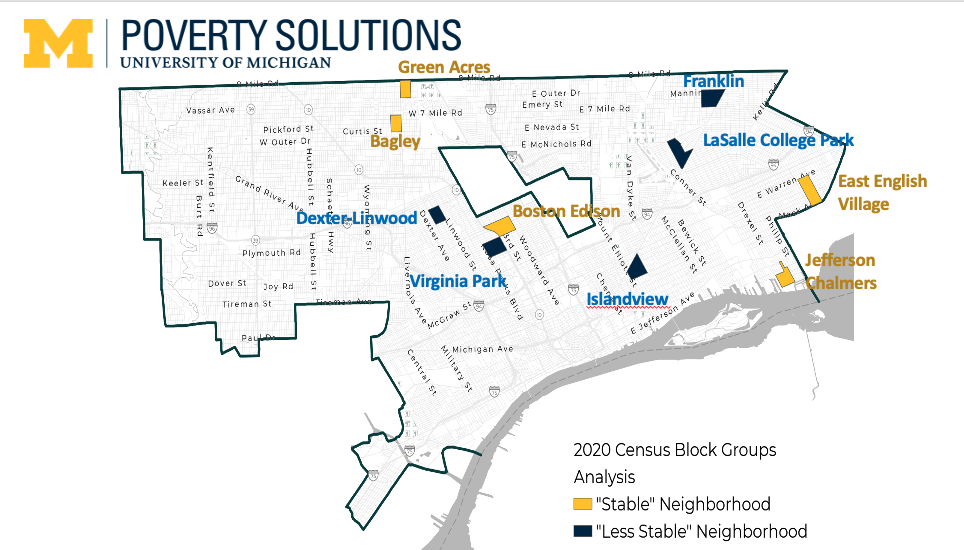Detroit’s 2020 Census Undercounted According to Audit from WSU, University of Michigan
Researchers estimated that Detroit’s population was 670,000 in 2019. The 2020 Census said there was a drop of 31,000 people compared to that figure.

Photo credit: Chris Calandro
Wayne State Unversity and the University of Michigan found an undercount in their audit of Detroit’s 2020 Census.
Using postal service data and their own canvassing efforts, researchers found the official count was off by more than 8% in ten surveyed neighborhoods. The Census reported nearly 640,000 thousand people living in Detroit, down nearly 11% from 2010.
The census’ 2019 estimate of Detroit’s population was 670,000 residents. The 2020 Census said there was a drop of 31,000 people compared to that figure, a decline that would be out of line with Detroit’s recent population trends, according to researchers.
“It is implausible to think the city’s population declined by 31,000 residents in one year, so we are conducting research to examine how this could have happened,” said Jeffrey Morenoff, U-M professor of sociology and public policy.
Auditing the Census
Researchers sampled ten Detroit neighborhoods, separated into two sets of five block groups: one set of residentially “stable” block groups and one set of less stable neighborhoods. Canvassers were sent to these neighborhoods to determine the occupancy/vacancy status of each housing unit.
Comparing the information gathered in the canvass and USPS data, they found that occupancy rates were 6-15% higher than the 2020 Census rates in stable neighborhoods.
“When the census numbers began to come in, these were places that raised immediate red flags, because it didn’t seem at all possible that you would see vacancy rates jump up as high as they did in some of these areas,” said Morenoff.
Morenoff compared Detroit’s low reporting numbers to those seen in San Antonio, Miami and Phoenix, which saw similar population dips in their counts when compared to 2019 estimates. Those cities have large foreign-born and Latino populations. Detroit’s foreign-born population is 6.1% according to past estimates.
“One of the fears heading into the 2020 Census was the chilling effect of the possibility of a citizenship question on the on the 2020 census might have,” says Morenoff. “That narrative does not explain the population drop in Detroit.”
Researchers at Wayne State went door-to-door to audit the Census data, often checking on places several times for a response.
“Our team went door to door with this database of every address and if there was no answer, no immediate way, we followed up in the afternoon and a nighttime visit,” said Ramona Rodriguez-Washington, program director at the Center for Urban Studies at Wayne State University, who led the in-person canvas for the study.
Those that participated in the official count say the effort was stymied by organization and assignment.
“The problem I really had was the proxies,” said past Census worker Clois Foster, referring to the practice of gathering responses from non-household members like neighbors. “I was doing [proxy reporting ] right away. It’s supposed to take six times, but I was doing proxies after one time.”
“And if no one’s around, I have to guess. So that’s not an accurate count,” Foster added.

Implications of an Undercount
The Census determines the number of Congressional seats and the flow of more than $675 billion in federal programs, including funding for programs such as Medicaid, the Supplemental Nutrition Assistance Program, the Section 8 Housing Choice Voucher Program and more.
“The independent analysis conducted by the University of Michigan and Wayne State is incredibly impressive and deeply troubling,” said Mayor Mike Duggan, speaking at a news conference on Thursday.
Duggan says he believes the undercount was intentionally done by the Trump administration.
“The U.S. government has inflicted an inequity of monumental proportion on the people of the city Detroit,” said Duggan
Duggan says the audit will help the city appeal its results through the U.S. Department of Commerce. He says if that fails, the city plans to sue in federal court.
Trusted, accurate, up-to-date.
WDET strives to make our journalism accessible to everyone. As a public media institution, we maintain our journalistic integrity through independent support from readers like you. If you value WDET as your source of news, music and conversation, please make a gift today.
